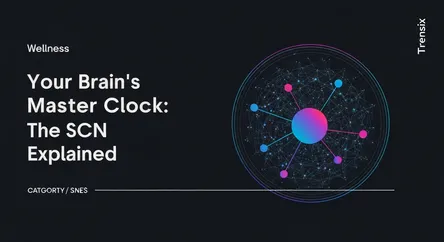Wellness
Your Brain's Master Clock: The SCN Explained

Discover the suprachiasmatic nucleus (SCN), your brain's tiny master clock that governs sleep, mood, and your daily biological rhythms.
What is it?
The suprachiasmatic nucleus (SCN) is a minuscule region in the brain's hypothalamus that functions as the body's primary biological clock or "central pacemaker." It is responsible for controlling circadian rhythms, which are the physical, mental, and behavioral changes that follow a roughly 24-hour cycle. The SCN receives direct light information from the eyes, allowing it to synchronize our internal body clock with the external day-night cycle. This master clock coordinates a wide range of bodily functions, from sleep to hormone release.
Why is it trending?
Interest in the SCN is rising in the wellness community due to the growing understanding of how vital circadian rhythms are for overall health. Modern lifestyles, filled with artificial light exposure at night and irregular schedules, can disrupt the SCN's signals. This misalignment is increasingly linked to numerous health problems, including sleep disorders, mood imbalances, and metabolic issues. Consequently, strategies to protect and reset this internal clock, such as light hygiene and maintaining consistent routines, have become a popular focus for improving well-being.
How does it affect people?
The SCN profoundly impacts daily life by orchestrating the sleep-wake cycle. It regulates the pineal gland's production of melatonin, the hormone that promotes sleep, signaling its release in darkness. It also governs daily cycles of body temperature, alertness, and the release of other hormones like cortisol. When the SCN is synchronized correctly, people feel awake and alert during the day and sleepy at night. Disruptions can lead to insomnia, daytime fatigue, and poor cognitive function, demonstrating its critical role in maintaining daily health and performance.